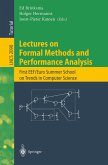Timing issues are of growing importance for the conceptualization and design of computer-based systems. Timing may simply be essential for the correct behaviour of a system, e.g. of a controller. Even if timing is not essential for the correct behaviour of a system, there may be good reasons to introduce it in such a way that suitable timing becomes relevant for the correct behaviour of a complex system. This book is unique in presenting four algebraic theories about processes, each dealing with timing from a different point of view, in a coherent and systematic way. The timing of actions is either relative or absolute and the underlying time scale is either discrete or continuous. All presented theories are extensions of the algebra of communicating processes. The book is essential reading for researchers and advanced students interested in timing issues in the context of the design and analysis of concurrent and communicating processes.
This book is concerned with a number of theories that can be used for describ ing and analyzing systems of interacting components in case it is desirable or necessary to regard their time-dependent behavior. Society is becoming increasingly more dependent on complex computer based systems that are composed of several components that act concurrently and interact - to synchronize and communicate with each other. The com plexity of these systems arises to a great extent from the many ways in which their components can interact. The need that these components act and in teract on time as well adds considerably to the complexity. In developing such a system, it is important to be able to acquire a better understanding of the relevant issues at the conceptual level, to describe the system in a precise way at various levels of detail, and to analyze it on the basis of the descriptions. When the early algebraic theories about processes, such as ACP [16, 17, 20], CCS [49, 50] and CSP [27, 39], were developed for that purpose, the established opinion was still that timing is a concern that can more often than not be treated independently. It is therefore not surprising that timing is deliberately ignored in those theories. They have now all been extended to deal with timing.
Hinweis: Dieser Artikel kann nur an eine deutsche Lieferadresse ausgeliefert werden.
This book is concerned with a number of theories that can be used for describ ing and analyzing systems of interacting components in case it is desirable or necessary to regard their time-dependent behavior. Society is becoming increasingly more dependent on complex computer based systems that are composed of several components that act concurrently and interact - to synchronize and communicate with each other. The com plexity of these systems arises to a great extent from the many ways in which their components can interact. The need that these components act and in teract on time as well adds considerably to the complexity. In developing such a system, it is important to be able to acquire a better understanding of the relevant issues at the conceptual level, to describe the system in a precise way at various levels of detail, and to analyze it on the basis of the descriptions. When the early algebraic theories about processes, such as ACP [16, 17, 20], CCS [49, 50] and CSP [27, 39], were developed for that purpose, the established opinion was still that timing is a concern that can more often than not be treated independently. It is therefore not surprising that timing is deliberately ignored in those theories. They have now all been extended to deal with timing.
Hinweis: Dieser Artikel kann nur an eine deutsche Lieferadresse ausgeliefert werden.
From the reviews: "This book gives a comprehensive overview of more than a decade of development of an algebraic theory of processes with time. ... Throughout the text small examples and exercises illustrate the theory. ... This book is well-suited as background material or even a starting point for researchers in this field. Due to its excellent readability and its abundance of exercises the book is even suited to be used in an advanced course." (J. F. Groote, Zentralblatt MATH, Vol. 1021, 2003)








